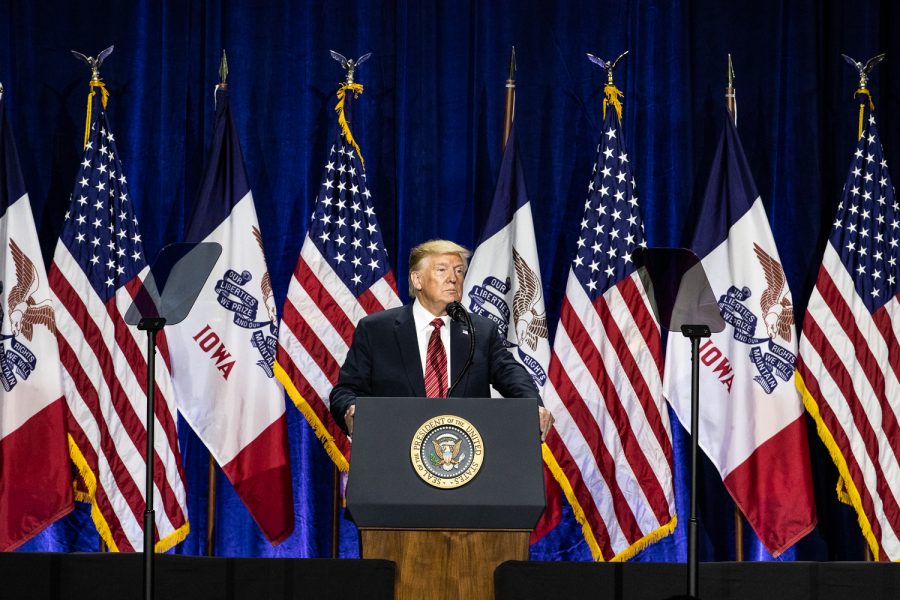Opinion: What happens when the trade war comes for the farmer’s market?
While the trade situation looks daunting for those in Iowa’s agricultural industry, there’s reasons to be optimistic.
President Donald Trump pauses during a speech at the Iowa GOP’s America First Dinner at the Ron Pearson Center in West Des Moines on June 11, 2019.
September 4, 2019
The economic stopwatch is now ticking after President Trump’s most recent tariff imposition on China took effect Sunday following a 15 percent tariff-rate hike on Chinese products — up 5 percentage points after threats to increase rates further. Americans will bear witness to all of its wildest hopes and dreams — or, alternatively, its worst nightmares — in regards to domestic purity.
Disputes over which economic destiny the U.S. will realize as a result of these taxes run rampant, but all consumers can agree on one thing: by retaliating against China with tariffs, Trump’s gamble will disproportionately affect certain industries.
Agriculture, a key industry in the state of Iowa, is among those most affected. Though many Iowan farmers are generally in support of this trade war, some are not so optimistic.
“It’s become increasingly difficult to get contracts for hogs and production,” said Ethan Vorhes, a farmer from Nashua, Iowa. “Everything we sell is starting to naturally become less profitable, so now no one wants to sign off on them. These tariffs just put the nail in the coffin.”
According to a study published by the Economic Research Service on Aug. 30, the U.S. value of crop production has risen more than 8 percentage points since 2010, making this sector of trade intentional. This trade war seems to endanger soybeans the most of all the crops tended by farmers.
Iowa State University Assistant Professor Mark Licht, an extension cropping systems specialist, says it’s all about supply and demand. China’s recent outbreak of swine fever and trade partnership with Brazil have caused soybeans to become much less of a necessity. Therefore, he said, the crop’s prices fall as demand drops. Suddenly, the U.S. is shielding another country from an import we don’t even really need.
“It has taken us decades [in the field of agriculture] to get where we’re at now,” Licht said. “After these tariffs have finally subsided, it will take decades more to reinstate the current agricultural economy.”
Even as the value of agricultural products such as soybeans and corn plummet, the livestock industry flourishes. “But ultimately,” Licht said, “if soybeans take a drop, there is a substantial impact on the farming industry.”
The U.S. offers significantly more arable land than China, according to the Food and Agricultural Organization of the United Nation, and that isn’t set to change any time soon. At the moment, it seems the two countries are engaged in a game of fighting fire with fire — or rather, trade barricade with trade barricade.
The ideal position for the U.S. is for China to need us just a bit more than we need them. However, the ultimate goal should be to live in a world abounding in free trade.
Although this may sound like a bit of a fairy tale, this is an achievable reality. Trump’s tariffs have a great potential, but a terrifying alternative outcome haunts Iowan farmers.
While it’s understandable that many may fear the potential downsides of the U.S.-China trade war, there’s a great opportunity to make the world better for everyone, including those in the Hawkeye State.
Columns reflect the opinions of the authors and are not necessarily those of the Editorial Board, The Daily Iowan, or other organizations in which the author may be involved.





